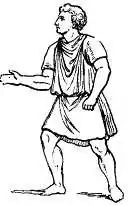tunica
Dutch
Pronunciation
- IPA(key): /ˈty.niˌkaː/
- Hyphenation: tu‧ni‧ca
Interlingue
Italian
Latin

opifex in tunicā (a worker in a tunic)
Etymology
Possibly of Central Semitic origin as Ancient Greek χῐτών (khitṓn), with a metathesis.[1] Compare Aramaic כִּיתּוּנָא (kittōnā, “tunic”) / ܟܘܬܝܢܐ (kuttīnā, kottīnā, “tunic”), Hebrew כֻּתֹּנֶת (kuttṓnĕṯ, “tunic”); from the word for flax, Aramaic כּיתָּנָא (kittānā, “flax”) / ܟܬܢܐ (kettānā, “flax”), Akkadian 𒃰 (GADA /kitû/, “flax”), Sumerian 𒃰 (gada, “flax”), ultimately a substrate word.
However Etruscan has been suggested as well.[2]
Compare also borrowed textile terms of unknown origin in Mycenaean Greek [script needed] (to-mi-ka) and [script needed] (to-ni-ja), both descriptions of textile, as well as [script needed] (tu-na-no, “kind of textile”).
Pronunciation
- (Classical) IPA(key): /ˈtu.ni.ka/, [ˈtʊ.nɪ.ka]
Audio (Classical) (file)
Noun
tunica f (genitive tunicae); first declension
- tunic, an undergarment worn by both men and women
- (figuratively) a coating, membrane, peel
Inflection
First declension.
| Case | Singular | Plural |
|---|---|---|
| Nominative | tunica | tunicae |
| Genitive | tunicae | tunicārum |
| Dative | tunicae | tunicīs |
| Accusative | tunicam | tunicās |
| Ablative | tunicā | tunicīs |
| Vocative | tunica | tunicae |
Descendants
References
- tunica in Charlton T. Lewis and Charles Short (1879) A Latin Dictionary, Oxford: Clarendon Press
- tunica in Charlton T. Lewis (1891) An Elementary Latin Dictionary, New York: Harper & Brothers
- tunica in Charles du Fresne du Cange’s Glossarium Mediæ et Infimæ Latinitatis (augmented edition, 1883–1887)
- tunica in Gaffiot, Félix (1934) Dictionnaire Illustré Latin-Français, Hachette
- tunica in Harry Thurston Peck, editor (1898) Harper's Dictionary of Classical Antiquities, New York: Harper & Brothers
- tunica in William Smith et al., editor (1890) A Dictionary of Greek and Roman Antiquities, London: William Wayte. G. E. Marindin
- Notes:
- Haupt, Paul (1902), “The Book of Canticles”, in The American Journal of Semitic Languages and Literatures, volume 18, pages 226–227
- Giuliano Bonfante & Larissa Bonfante, The Etruscan language: An introduction, 2nd ed., 2002. p.114
This article is issued from Wiktionary. The text is licensed under Creative Commons - Attribution - Sharealike. Additional terms may apply for the media files.